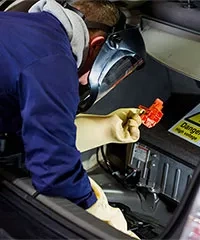Invest 2035: the UK’s modern industrial strategy: IMI response

Invest 2035 ignores 724,000 automotive workforce outside the factory gates
The IMI is disappointed that the government’s pre-election commitments to automotive are not evident in new Industrial Strategy
The Institute of the Motor Industry (IMI) is hugely disappointed that ‘Invest 2035: the UK’s modern industrial strategy’, published today, focuses on ‘growth industries’ with specific funding to train people for work in defence, engineering, digital and construction roles, with little reference to the automotive sector.
Sarah Sillars OBE, Hon FIMI, Interim CEO at the IMI said: "It is encouraging to see the commitment to skills with a £1.2 billion investment in training over the next 10 years. However, it appears the Labour Party’s pre-election promise to deliver a dedicated Automotive Strategy has not yet materialised. This is despite the automotive sector playing a pivotal role in the UK's industrial landscape, providing 866,000 jobs inside and outside the factory gates and £37 billion GVA (2023). There seems to be a lack of understanding of the fundamental role the people and businesses that operate outside the factory gates play, particularly in relation to emerging automotive technologies, with the growth of electric motoring being critical to the government’s net zero targets.
“Having engaged with ministers and departments since the Green Paper was published, the IMI was hopeful that the workforce needs of the sector would be addressed in the strategy. Sadly, that has not been the case. Despite contributing significantly to employment, net zero ambitions, and clean growth, automotive is being overlooked across several government policies. For example, the recently published Skills England Report under-represented the automotive aftermarket and technician workforce.
“The latest IMI data shows there are currently over 16,000 unfilled roles in automotive. There could also be a need to replace 144,000 (19%) of the current workforce due to retirement by 2032. This all severely impacts the sector’s ability to be future-ready as technological innovation accelerates alongside the current parc of petrol and diesel vehicles.”
Retaining existing members of the workforce and empowering them with the skills of today’s technologies and those that are fast emerging, is a primary concern for the IMI, as is creating a pipeline of talent through apprenticeships, vocational training, and upskilling programmes. Its manifesto, ‘Driving the Future of Automotive Professionals’ sets out clear, actionable steps to attract new talent into the sector, create defined career pathways, support the upskilling of the existing workforce, and ensure the industry is equipped with the skills it needs for the future.
Despite the lack of focus on automotive in the government’s Industrial Strategy, the IMI will continue to work with employers, policymakers, and educators to build a thriving, future-ready industry, addressing the specific challenges they face – whether it’s navigating complex funding systems, understanding qualification requirements, or finding skilled candidates.





